Choking of the MEA
Even though the last Viceroy left Raisina Hill decades ago, the imperious nature of South Block remains. It houses the ministries of Defence, External Affairs and the PMO. From Nehru’s days, the PM and PMO have dictated diplomacy’s direction. However, when Manmohan Singh took over in 2004, he wanted a lean, mean PMO, which allowed different ministries—including MEA—functional autonomy; and confine itself to the allocation of business. The PMO and Cabinet Secretary were expected to perform only a coordinating function. But what started well hasn’t ended well. In seven years, the MEA has been emasculated. It finds itself boxed between the defence ministry and PMO. Perhaps the root of this problem lies in Pranab’s Mukherjee tenure as foreign minister. He would act only according to his wisdom and not take directions. He was shifted in 2009 because the PMO felt that he should only be a ceremonial figure, crisscrossing the globe for protocol PR. S M Krishna, the suave, foreign-educated politician was next. But he proved a liability, as he forgot to walk the dotted line. The search for another external affairs minister began. The choice fell on Oxonian Salman Khurshid. Soon after taking over, he made a categorical statement that he would act independently, guided only by the PM and Congress leadership. South Block scuttlebutt says he hasn’t got the elbowroom he wanted. Though Khurshid is travelling widely, PMO factotums—who don’t want him to discover their engagements with American diplomats—are discouraging his visits to important countries. Recently, a proposed US visit was inexplicably scuttled. According to insiders, the PM’s minders feel that festering bilateral issues and a comprehensive agenda for Indo-US talks should be decided by the PMO. MEA cynics argue that if the PMO is working on Manmohan’s US itinerary without the involvement of the MEA and its minister, why not wind up the ministry altogether? Better still, why not merge the MEA formally with the PMO? Watch this space.
Extension tension
Extensions after retirement are rewards of loyalty. They also signify the utility of the person seeking the extension. Often, a thin dividing line exists between extensions that are solicited and those given on merit. Now, even senior diplomats are willing to sacrifice their dignity to get short-term extensions. For example, former ambassador to Islamabad, Sharad Sabharwal, was given a short extension in September 2012. When his extended tenure came to an end, he reportedly lobbied for another six months but settled for two. The previous envoy to Paris, Rakesh Sood, was happy with just a month. Both cases contrast sharply to Nalin Surie’s, the former High Commissioner to London. S M Krishna offered him a five-month extension, which he politely declined. Surie’s response was that if the government thought he was doing a good job, he could be given a proper tenure. Whimsical extensions have led to delays in new postings and disturbed posting cycles. Arbitrary distribution of favours is making the entire system vulnerable to misuse and crippling diplomatic credibility. It is due to the lack of a transparent system of granting extensions and giving new postings that those in charge are clearly overlooking several officers who have been languishing at their desks well after their tenures have ended. Among the luminaries in this list are Mahesh Sachdev, High Commissioner to Laos since 2008; P K Kapur, ambassador to Santiago since 2009; and Divyabh Manchanda, ambassador to Sofia since 2009. Have they been forgotten or is it a strategy to let them retire without an extension?
Corner room conundrum
South Block mandarins are watching out for the next occupant of the Foreign Secretary’s corner room. Current occupant Ranjan Mathai’s term expires in July. They were expecting the PM to announce his successor after his return from Germany. Top diplomats were given clear indications that Sujatha Singh, ambassador to Germany, would land the job. But the delay in announcement indicates the battle and lobbying going on within the PMO. It was speculated that the PM would personally inform Sujatha on his German visit. Besides her diplomatic acumen and seniority, she is considered a most credible Foreign Service officer with vast experience in handling sensitive diplomatic issues. But her assertive demeanour could be her nemesis. In case her claim is ignored, the beneficiary would be Mathai, who enjoys the support of the Kerala lobby. But the 1976-batch Sujatha has made it clear that she would not report to any Foreign Secretary who is junior to her. Earlier, when Sudhir Vyas, a 1977-batch IFS officer, was appointed secretary, West, Sujatha insisted she would deal directly with the Foreign Secretary. However, two other officers of her batch—Bhaswati Mukherjee and Sushmita Thomas—who are serving as ambassadors to The Netherlands and Turkey had no such compunctions. But the PM hasn’t frozen the name of the new Foreign Secretary yet. Since his advisers are opposing Sujatha’s candidature, a name being mentioned is that of S Jaishankar, ambassador to Beijing. But he is no pushover either. One of the PM’s principal advisers feels Jaishankar is even more unpalatable than Sujatha. Mathai promoters are confident that the current incumbent will continue in the corner room.
Conflict of interest
The government has rules and procedures to ensure that unscrupulous officials do not use their official positions to negotiate lucrative post-retirement deals. The MEA is confronted with a novel problem. How to deal with a retired IFS officer—now employed by a London-based group—who is officially designated the India head of a European defence consortium and yet writes prolific articles, insisting on being identified with his previous designation? There are other retired officers who are associated with corporates, but also work closely with the government. Is it because persona non grata doesn’t apply to all after retirement?
prabhuchawla@newindianexpress.com; Follow me on Twitter @PrabhuChawla


No comments:
Post a Comment